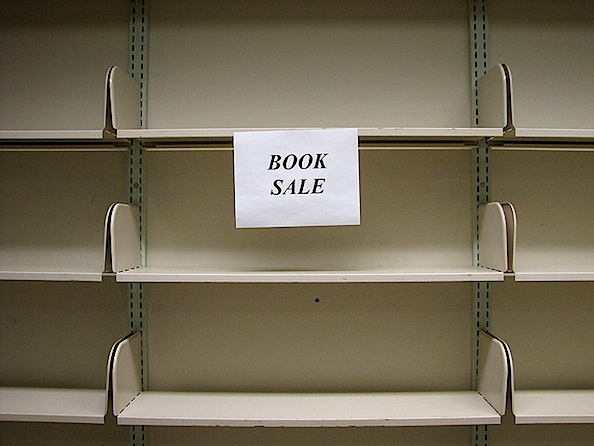
Photo by emdot
I’ve written before about how I started reading a lot when I was pretty young, and I’ve kept reading throughout my life. Books have a very special ability to take you to new places, to open up new worlds, to introduce and explain fascinating things. It boggles my mind how few people are readers; how else do you find out about the world beyond your front door?
So I’ve been collecting books for a long time, on a wide array of topics, both fiction and non-fiction. I had between 500-1000 books in 2009 when I started getting rid of some, and that doesn’t count the many books I’ve given away, sold, or read via the library.
I’m not exactly sure what made me want to get rid of the books in the first place; I think a big part was just being tired of moving them around, and acquiring a taste for minimalism and owning less stuff. My books at the time made up the bulk of my possessions, so they were a natural place to start. The first step was just getting rid of all the books that I had no intention of reading again, which cut my collection in half. This was an improvement in terms of reducing clutter, and since I had no intention of reading those particular books again, I hadn’t lost much.
When you start to get rid of stuff, it’s very easy to get addicted. Throwing or giving things away is incredibly liberating, and after a couple days, you realize just how little you probably want or need a lot of other things that escaped the trash last time. So it was with my books; getting rid of half of them just left me dissatisfied with the huge pile that still remained.
But at the same time, I really do love books, and the books that were left on my shelf at this time represented some great memories. Each one was a little piece of me, something that had changed my life in some way, some small, some big, but they had all had an impact. How could I get rid of them?
Enter the Kindle. Ebook readers had been around for years Amazon released the Kindle in late 2007, but I kept hearing about it throughout 2008, so when they released the Kindle 2 in early 2009, I started taking a closer look. I really liked what I saw, especially since so many of my favorite books were already on the platform. This was a crucial part of the decision for me, since I do occasionally re-read books that I’ve enjoyed.
I finally got my Kindle in August 2009 and that was that. Within a few weeks, I had gotten rid of all the books that were available on Kindle (plus a bunch that weren’t). All my books now fit on one shelf in my small bookcase, and I expect to cut that in half again in the next six months. The only books I didn’t get rid of are some specific technical books that don’t work well with the Kindle format (more on this below) and some out-of-print books from my childhood.
The advantages have been numerous, but here’s the big ones:
I have much less clutter and stuff now. This is obviously a personal taste issue, but it’s so nice to have less stuff. It’s just so much more relaxing, and I highly recommend it.
I read a lot more. This is ultimately what it’s all about. I can now carry my entire library with me almost everywhere I got, and I do. This has enabled me to read whatever I feel like reading whenever I feel like reading it. I don’t have to choose between taking boots or books on vacation. I don’t have to lug heavy books on the subway. I can carry thousands of books with me everywhere I got, and access to hundreds of thousands more with just a few clicks.
Now, the transition hasn’t been without issues. Here’s a few of the disadvantages:
I miss the feel of an actual paper book. Another personal taste issue, but it is nice to be able to hold a physical book.
Not great for technical, visual, or reference books. Flipping around in the Kindle is a pain, and it doesn’t handle large diagrams or code formatting well, so I’ve still got a lot of technical and visual books. However, I expect this disadvantage to disappear somewhat quickly as the technology matures.
Can’t loan books to friends. However, this is a minor issue for me now.
Few actual books in our house. One of the things I do wonder about is the effect of a “bookless” house on my future children. Studies have shown that growing up in a house with more books has more of an effect on kids than their parents’ education level. Hopefully someone will do a study to verify if digital books have the same effect, and if not, I can go buy a few thousand books when we have kids. 🙂
Ultimately, though I think the benefits far, far outweigh the drawbacks. The purpose of books isn’t to impress friends or feel good every time you look at your bookshelf. They’re there to transfer information from one person to (many) others. Ebooks are more efficient at accomplishing that goal, and they come with some many advantages that I think they’ll own 95% of the market in ten years. Just like people still buy records, I think paper books won’t disappear completely, but our kids will have little exposure to them and will probably make fun of us for using them. At the end of the day, almost anything that can be digitized, will be. For better or worse, books are no exception.
If you love to read and you want to read more, get started today.